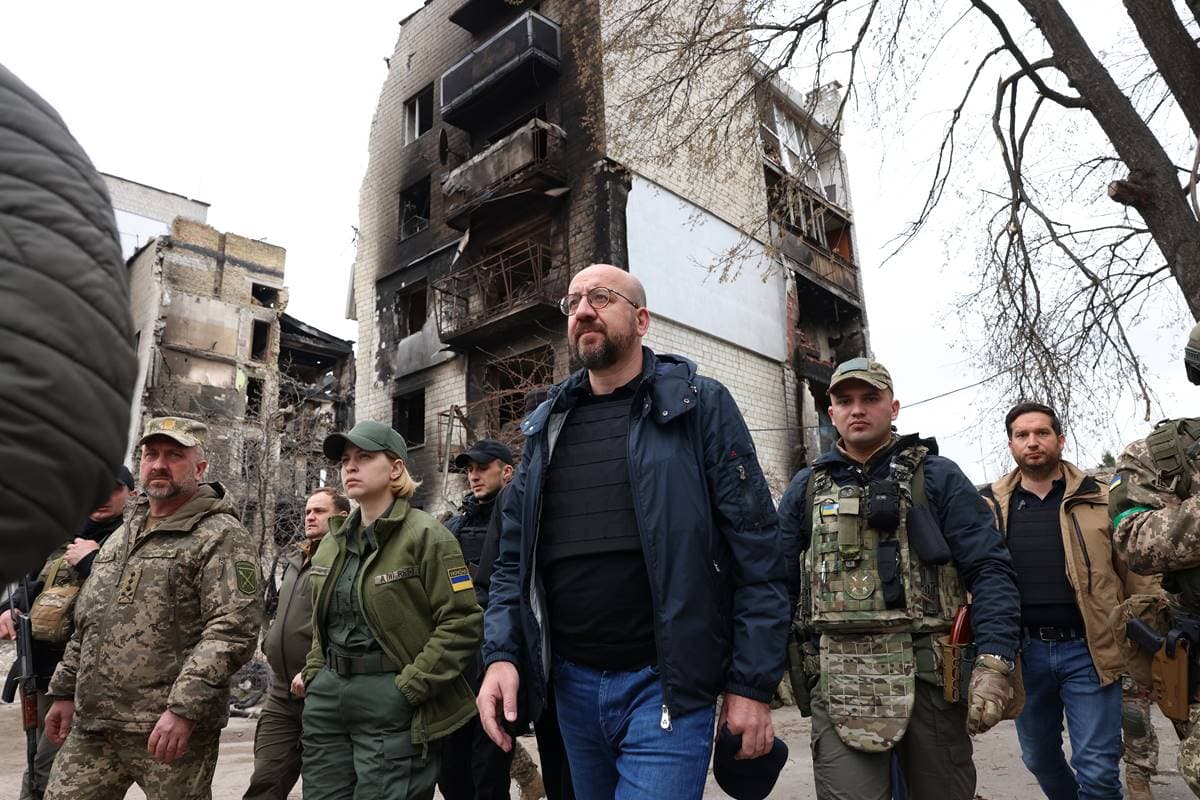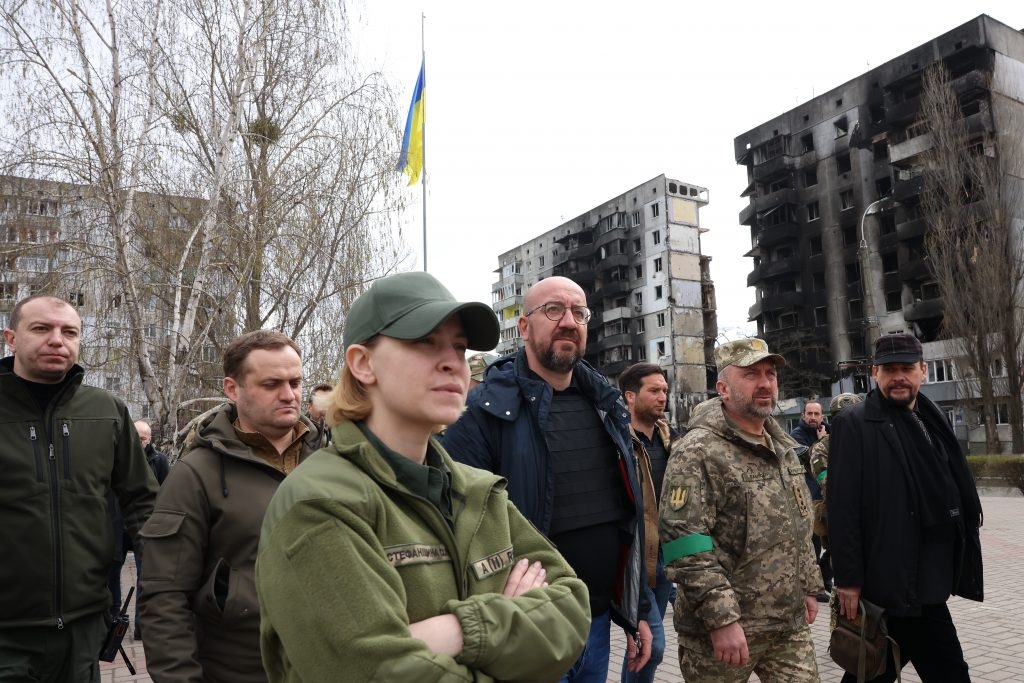EU Council president visits Russian war crime scenes, says EU must do more for Ukraine

BORODYANKA, Kyiv Oblast – Walking through the town of Borodyanka, 40 kilometers northwest of Kyiv, European Union Council President Charles Michel wasn’t hiding his grief.
Visiting the largely destroyed Ukrainian town that he has likely never heard of until recently, the official was trying to carefully pick words of support. The lack of unity inside the EU limited the promises he could make.
“We can do more, and we will do more,” said Michel, stopping short of saying whether the EU was close to imposing an embargo on Russian oil. The sixth round of European sanctions is set to be announced on April 25.
“It’s on the table,” he told the Kyiv Independent. “I said in the European Parliament a few weeks back that sooner or later it will be needed to take sanctions on (Russian) oil and gas.”
But Michel said that the decision hasn’t yet been reached on how to maximize the cost for Russia and minimize the cost of the ban for EU countries.
Horrors of Borodyanka
The once peaceful town of Borodyanka, with a pre-war population of nearly 20,000, is now in ruins.
After nearly a month of Russian attacks and occupation, which lasted from early March to April 1, eight apartment buildings were completely destroyed, along with 437 single-family houses, said Borodyanka Town Council Secretary Heorhiy Yerko.
He added that 32 buildings and around 540 houses are also damaged.
“The whole street is like this,” Yerko said, showing Michel the town’s main street. “Half of the town doesn’t have a place to live in. That’s currently the main issue.”
Michel, a guest unimaginable in Borodyanka before Feb. 24, was the latest high-rank European official visiting the town after Russian troops were kicked out of the region, leaving behind hundreds of killed, injured, tortured, and raped civilians.
“I listen, I have three children, it’s shocking, there are no words,” said Michel. “It’s one thing to watch this on TV, it’s something else to be here.”

After listening to stories of civilians whose relatives were killed, and houses looted, Michel said that Russian actions in Borodyanka were a war crime.
“It’s very important to support all the efforts of Ukrainian justice, together with international justice, in order to make sure there won’t be impunity,” said Michel.
“We support all the efforts to collect the evidence in order to punish those responsible for those war crimes that were committed here, that are (being) committed on the ground in Ukraine in many other cities, as we speak,” he added.
European lack of union
However, despite the compassion shown by the EU Council president, he didn’t have good news to share.
In his afternoon meeting with Michel, President Volodymyr Zelensky urged the EU to impose a “full embargo” on Russian oil and gas, saying that at least an oil embargo should be part of the sixth package of sanctions against Russia, otherwise it “will not be powerful, but will be empty.”
Yet, EU countries aren’t prepared to impose an embargo on Russian energy, while Michel and European Commission Ursula von der Leyen, who visited Bucha earlier this month, don’t have the power to facilitate the implementation of such sanctions.
According to Bloomberg, the European Union is paying nearly $1 billion a day to Russia for oil, gas, and coal, which is an increase by over a third from 2021. The same agency reported that nearly 40% of the Russian budget, used to build war machines and pay war criminals, comes from energy exports.
A day before Michel’s unannounced visit to Ukraine, French Economy Minister Bruno Le Maire said there is opposition to imposing an oil embargo on Russia.
"We are trying to convince our European partners to stop importing oil from Russia," Le Maire told French radio Europe 1, adding that “some European partners are still hesitant."
The EU receives 40% of its gas and over 25% of its oil from Russia, making many countries heavily dependent on the totalitarian state.
The Union’s three main importers of Russian energy are Italy, the Netherlands, and Germany. German President Frank-Walter Steinmeier has admitted that his country “failed on many points" in its dealings with Russia.
While paying Russia for oil and gas, all three countries have recently agreed to send heavy arms to Ukraine.
Meanwhile, in Borodyanka, a town far from the EU border, 41 bodies of civilians have been recently retrieved from under the rubble left by Russian airstrikes.
Michel, having little influence over European domestic policies, promised Ukraine to bolster economic, political, and military support.
“Together (with the U.S., Canada, and the U.K.) we’ll support the initiative to rebuild the country as soon as possible,” said Michel, adding that meanwhile, the EU will continue to arm Ukraine so that atrocities he witnessed in Borodyanka don’t happen elsewhere.









